Unit 2 No Rules,No OrderSection A 1a-2f 课件+音频(共54张PPT)人教版(2024)七年级下册
文档属性
| 名称 | Unit 2 No Rules,No OrderSection A 1a-2f 课件+音频(共54张PPT)人教版(2024)七年级下册 | 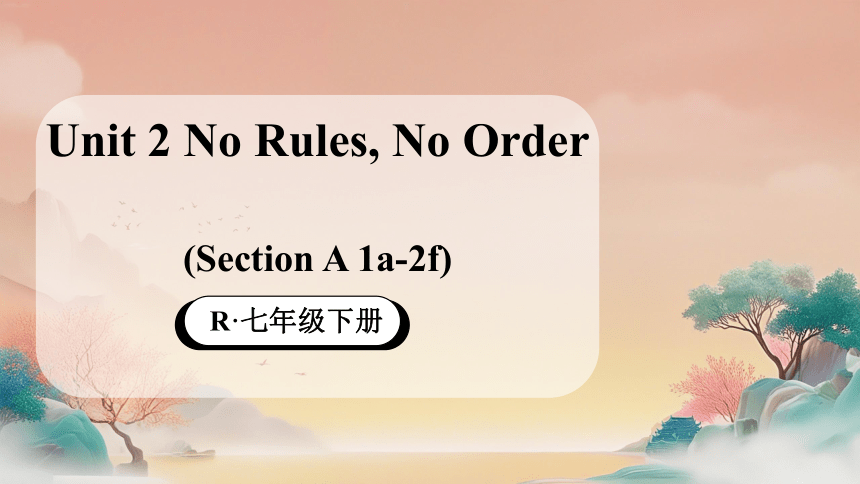 | |
| 格式 | pptx | ||
| 文件大小 | 57.0MB | ||
| 资源类型 | 教案 | ||
| 版本资源 | 人教版 | ||
| 科目 | 英语 | ||
| 更新时间 | 2025-07-15 12:32:47 | ||
图片预览


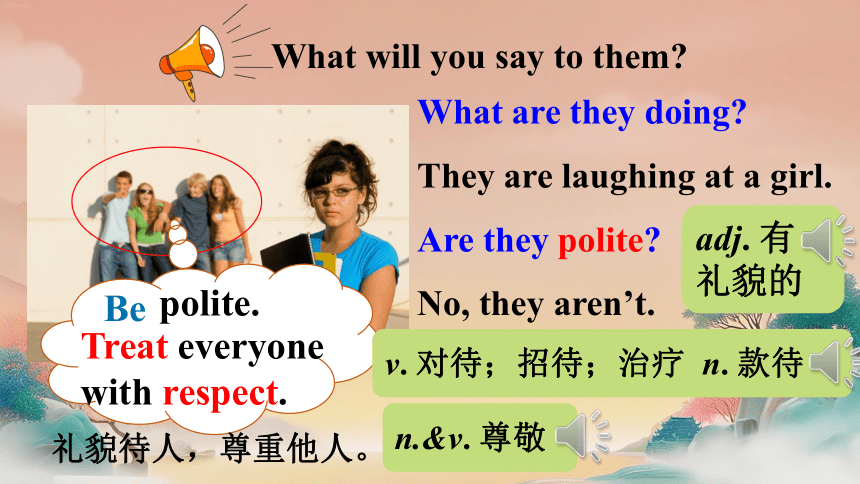
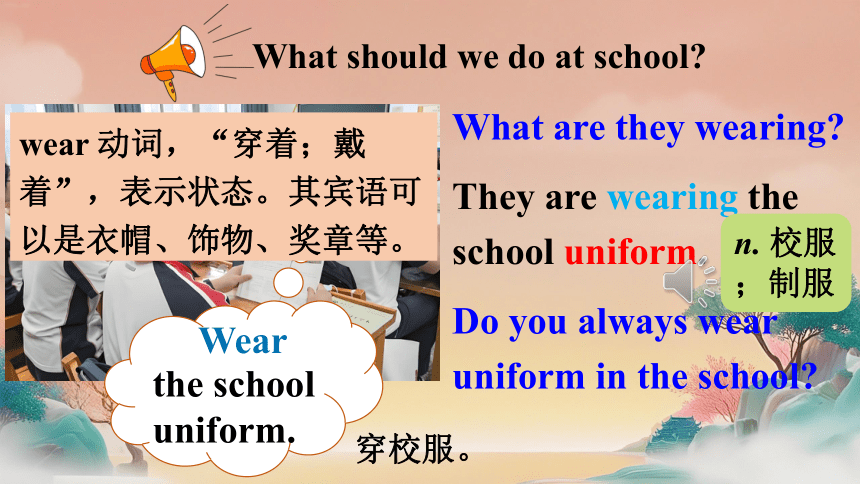

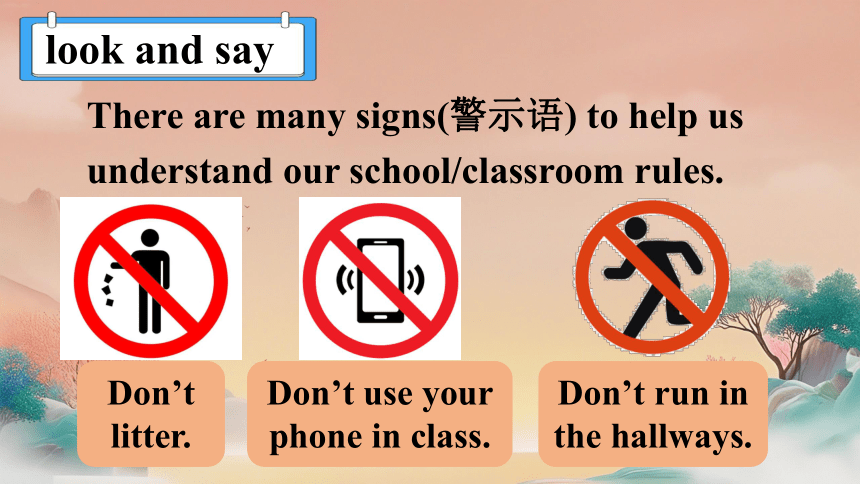
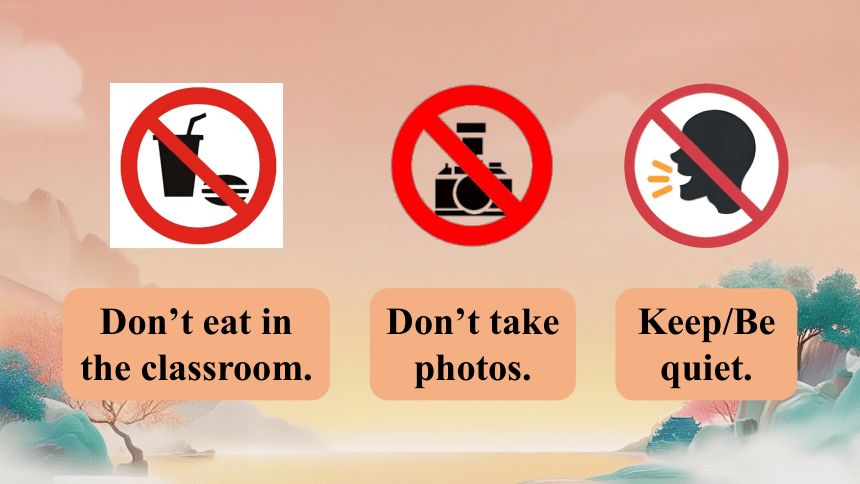
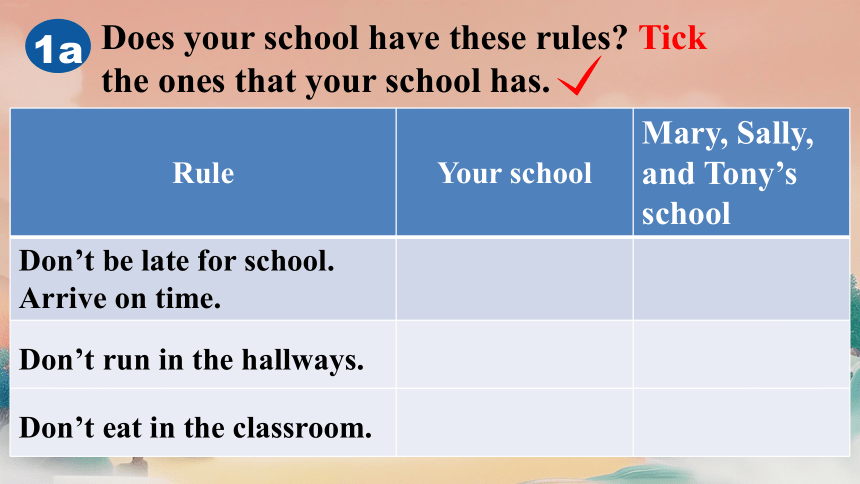
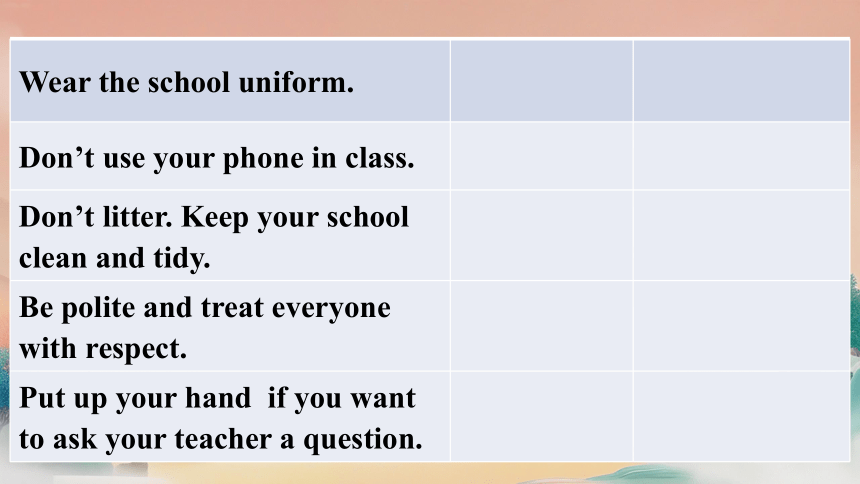
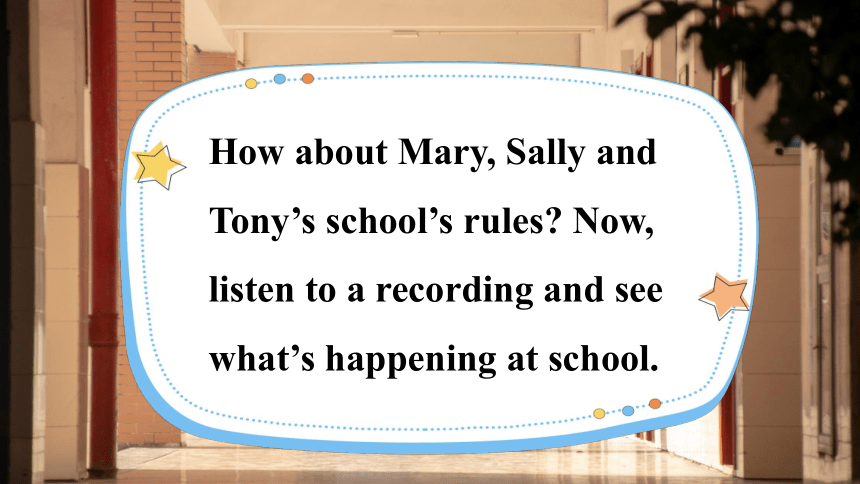
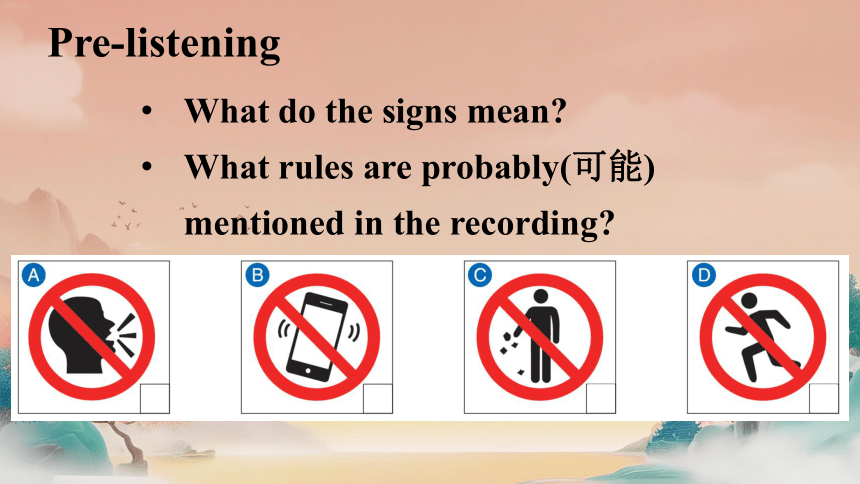
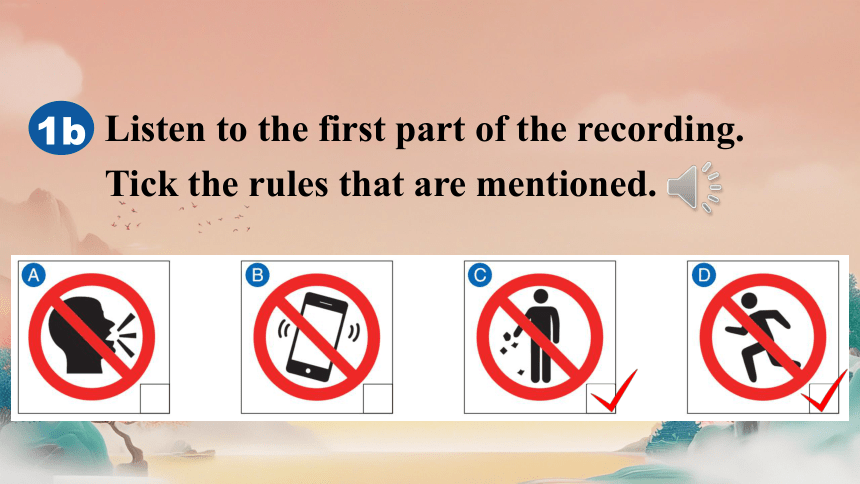
文档简介
(共54张PPT)
Unit 2 No Rules, No Order
(Section A 1a-2f)
R·七年级下册
arrive作不及物动词,意为“到达”,其后不能直接跟宾语,后常接in或at。
arrive in+大地点(如国家、城市等)
arrive at+小地点(如村庄、车站等)
例:你什么时候到达武汉?
When do you arrive in Wuhan
我们准时到达了车站。
We arrived at the station on time.
Arrive on time.
What are they doing
They are laughing at a girl.
Are they polite
No, they aren’t.
Be
polite.
adj. 有礼貌的
Treat everyone with respect.
v. 对待;招待;治疗 n. 款待
n.&v. 尊敬
礼貌待人,尊重他人。
What will you say to them
What are they wearing
They are wearing the school uniform.
Wear
the school uniform.
Do you always wear uniform in the school
穿校服。
wear 动词,“穿着;戴着”,表示状态。其宾语可以是衣帽、饰物、奖章等。
n. 校服;制服
What should we do at school
What’s the girl doing
She is putting up her hand.
Is it a polite action
Yes, it is.
What will you do if you want to ask your teacher a question
Put up your hand.
conj. 如果,用来引导条件状语从句。
请举手。
There are many signs(警示语) to help us understand our school/classroom rules.
Don’t litter.
look and say
Don’t use your phone in class.
Don’t run in the hallways.
Don’t take photos.
Keep/Be quiet.
Don’t eat in the classroom.
Rule Your school Mary, Sally, and Tony’s school
Don’t be late for school. Arrive on time.
Don’t run in the hallways.
Don’t eat in the classroom.
Does your school have these rules Tick the ones that your school has.
1a
Wear the school uniform.
Don’t use your phone in class.
Don’t litter. Keep your school clean and tidy.
Be polite and treat everyone with respect.
Put up your hand if you want to ask your teacher a question.
How about Mary, Sally and Tony’s school’s rules Now, listen to a recording and see what’s happening at school.
Pre-listening
What do the signs mean
What rules are probably(可能) mentioned in the recording
Listen to the first part of the recording. Tick the rules that are mentioned.
1b
Listen again. Complete the sentences.
1c
1. Mary can’t _________in the __________ .
2. Sally mustn’t wear her own jacket at
________. She has to wear ____________.
3. Tony can’t _________. He must keep the
school _____________________.
run
hallway
school
the uniform
litter
clean and tidy
n. 夹克衫;短上衣
Listen and check the answers.
Mary, slow down! Don’t run in the
hallway, please.
I’m sorry! I don’t want to be late. Sally, you know the rules. You can only wear the uniform in school. You can’t wear that jacket here.
Sorry, Ms Brown.
Part 1
Ms Brown:
Mary:
Ms Brown:
Sally:
Why is there a bottle here
Oh! Sorry, Ms Brown. Sorry.
Tony, you know you mustn’t litter. We have to keep the school clean and tidy.
Yes, Ms Brown.
Ms Brown:
Tony:
Ms Brown:
Tony:
不得不
Listen to the second part of the recording. Who is the speaker What rules does she talk about Tick them in 1a.
1d
Tip: Focus on the key words related to rules while listening.
Listen and answer
1. Who is the speaker
2. What rules does she talk about
Ms Brown is the speaker.
① Walk in the hallway. Don’t run.
② Wear the uniform.
③ Don’t litter.
④ Be polite and treat everyone with
respect.
Listen again and find out:
What’s the purpose(目的) of the speech
She noticed that some students disobeyed(不遵守) the school rules this morning. So she expects all the students to follow the school rules.
遵守校规
v. 遵循;跟随
Part 2
Listen and check the answers.
Ms Brown:
禁止
Good morning, students. This morning, I had to tell some students to follow the school rules. Please remember them, everyone! Walk in the hallway. Don’t run! You have to wear the uniform. You mustn’t wear other clothes to school instead.
Ms Brown:
Don’t litter. Make sure to keep the school tidy. And most importantly, we must be polite and treat everyone with respect. If we follow these rules, we can have a happy and safe school! Thank you.
make sure to do sth. 确保做某事
most importantly 最重要的是
You can’t wear that jacket here.
Read the sentences and find out the sounds of the letters highlighted below.
Make sure to keep the school tidy.
/e /
/i /
/i /
And most importantly, we must be polite and treat everyone with respect.
/e/
Don’t run in the hallway, please.
/i /
Listen and repeat. Add one more word to each group.
Pronunciation
e ea ee ear /i / /e/ /i / /e/ /i / / / /e /
1
she
these
______
bed
pet
______
please
speak
______
tree
sleep
______
ear
dear
______
pear
bear
______
head
ready
______
me
chess
clean
already
beef
near
wear
元音字母e及字母组合ea、ee、ear在重读音节中的读音
元音字母 及组合 读音 发音要领
e /i / 舌尖抵下齿,舌前部尽力向口腔上壁抬起。双唇微微张开,呈扁平口形
/e/ 舌尖抵下齿,舌前部向口腔上壁抬起。双唇呈扁平口形,上下齿之间可容一指
元音字母 及组合 读音 发音要领
ea /i / 舌尖抵下齿,舌前部尽力向口腔上壁抬起。双唇微微张开,呈扁平口形
/e/ 舌尖抵下齿,舌前部向口腔上壁抬起。双唇呈扁平口形,上下齿之间可容一指
元音字母 及组合 读音 发音要领
ee /i / 舌尖抵下齿,舌前部尽力向口腔上壁抬起。双唇微微张开,呈扁平口形
ear / / 发音时,由/ /音滑向/ /音,前重后轻,口形随之变化
/e / 发音时,由/e/音滑向/ /音,前重后轻,口形随之变化
In pairs, talk about the rules in 1c.
1e
Can Mary run in the hallway
No, she can’t. she has to walk
in the hallway.
Can Sally wear her own
jackets at school
No, she can’t. she has to
wear the school uniform.
Can Tony litter
No, he can’t. he must keep
the school clean and tidy.
Listen to the conversation and circle the coloured words you hear.
2a
Hi, I’m Anne. What’s your name
Hello! I’m Tom. It’s my first day here.
It’s nice to meet you, Tom! Is everything OK
Well, I can’t find my pencil box/ pen.
I think it’s in my locker/at home.
Anne:
Tom:
Anne:
Tom:
pron. 每件事;一切
Read, check and predict(猜测) the new words or phrases in green.
在储物柜里
铅笔盒
Here, I can lend you my pen.
Thanks! Would you like a sweet
No, thank you. We can’t eat snacks in class.
Can we eat fruit/drink water
Yes, of course.
OK, thanks ... Oh! I’m sorry, I have to answer my phone.
Anne:
Tom:
Anne:
Tom:
Anne:
Tom:
v. 借给;借出
n. 糖果 adj.甜的
n. 点心;小吃
当然
Oh, but we can’t/mustn’t bring our mobile phones to class. We have to turn them off and put/ keep them in our lockers. That’s another rule.
OK! Thanks for telling me, Anne.
You’re welcome, Tom.
Anne:
Tom:
Anne:
mobile adj. 可移动的
mobile phone手机
turn off 关掉
(水、电或煤气)
存放
禁止
不可能
放置
Does Tom know the school rules well Why
No, he doesn’t. because it’s his first day here.
Read the conversation and complete Tom’s notes about the school rules.
School rules
We cannot ___________________________
We must not __________________________
We have to ___________________________
eat snacks in class.
bring our mobile phones to class.
turn off our mobile phones
and keep them in our lockers.
2b
不得不
不能
禁止
Read the conversation again and answer the questions.
2c
Why is the day special for Tom
What does Anne lend to Tom
Why doesn’t Anne take a sweet from Tom
Can Tom and Anne use their phones in class
Where must they keep their phones
Do you think they have good school rules Give your reasons.
Why is the day special for Tom
What does Anne lend to Tom
Why doesn’t Anne take a sweet from Tom
Can Tom and Anne use their phones in class
Because it’s his first day in the school.
Anne lends her pen to Tom.
Because they can’t eat snacks in class.
No, they can’t.
Where must they keep their phones
Do you think they have good school rules
Give your reasons.
They must turn them off and keep them
in the lockers.
Yes, I think they have good school rules.
Because these rules help them listen to
the teachers carefully.
Complete a summary of the conversation.
2d
It’s Tom’s _____ day at this school. He doesn’t know the school _____ well. Anne tells him about them. They _____ eat snacks in class, but they _____ drink water. They can’t bring their mobile ______ to class. They must _____ them off and keep them in their _______.
first
rules
can
can’t
phones
turn
lockers
What words are usually stressed in sentences
在句子中通常什么单词是重读的?
Listen to the conversation again and pay attention to the stressed words. Then
role-play the conversation.
2e
重读单词
Listen to the chant and notice the stressed words. Then listen again and repeat.
2
Pronunciation
Across the country, in many schools,
Students like us follow rules!
Be on time. Don’t be late for class.
Keeping the rules is good for us!
Every day, from Monday to Friday,
Keep our school clean and tidy!
Raise your hand. Walk and don’t run.
Keep the rules and let’s have fun!
英语中每个独立的词都有词的重音,但在连贯言语中有些词就失去重音了,这是因为并非所有的词在语句中都有同等的重要性。一般来说,名词、动词、形容词,副词和数词等实词重读,而冠词、介词、连词、人称代词、助动词、情态动词肯定式等虚词不重读。
Content Words
Nouns(名词):
Main Verbs(动词):
Adjectives(形容词):
Wh-words(疑问词):
Adverbs(副词):
paper, coffee, Mr. Smith…
talk, watch, need, find…
tall, blue, beautiful…
why, what, how
slowly, always…
Negation words(副词):
Possessive pronouns:
(名词性物主代词):
This/that as pronouns:
no, not, isn’t. won’t…
Those are hers.
She wants this.
Try to read
I can dance, but I can’t swim.
—Does he like the rules
—No, he doesn’t.
—What time do you usually have breakfast
—At seven thirty.
Hi, I’m Anne. What’s your name
Hello! I’m Tom. It’s my first day here.
It’s nice to meet you, Tom! Is everything OK
Well, I can’t find my pencil box.
I think it’s in my locker.
Anne:
Tom:
Anne:
Tom:
Listen carefully and mark the stressed words in the conversation.
Task 1
Here, I can lend you my pen.
Thanks! Would you like a sweet
No, thank you. We can’t eat snacks in class.
Can we eat drink water
Yes, of course.
OK, thanks ... Oh! I’m sorry, I have to answer my phone.
Anne:
Tom:
Anne:
Tom:
Anne:
Tom:
Oh, but we mustn’t bring our mobile phones to class. We have to turn them off and keep them in our lockers. That’s another rule.
OK! Thanks for telling me, Anne.
You’re welcome, Tom.
Anne:
Tom:
Anne:
Task 2
Work in pairs and role-play the conversation.
Hi! I’m Anne. What’s your name
Hello! I’m Tom. It’s my first day here.
Checklist Complete in content(内容完整) ☆☆☆
Good pronunciation and intonations(不错的语音语调) ☆☆☆
Cooperate well (合作默契) ☆☆☆
Peer-assessment
Talk about the rules you have at school. Use the expressions to help you.
2f
What rules do we have at school
We must/ mustn’t… We should…
We can/ can’t… Don’t…
We have to… Always…
For example
What rules do we have at school
We have to eat in the
dining hall. Always we have
to wear school uniforms.
Summary
Pronunciation
the stressed words
Talk about
school rules
We must/mustn’t…
We should…
We can/can’t… Don’t…
We have to… Always…
Review key words, sentences and language points.
Talk about your school rules using the modal verbs, must/mustn’t, can/can’t and have to.
Homework
Unit 2 No Rules, No Order
(Section A 1a-2f)
R·七年级下册
arrive作不及物动词,意为“到达”,其后不能直接跟宾语,后常接in或at。
arrive in+大地点(如国家、城市等)
arrive at+小地点(如村庄、车站等)
例:你什么时候到达武汉?
When do you arrive in Wuhan
我们准时到达了车站。
We arrived at the station on time.
Arrive on time.
What are they doing
They are laughing at a girl.
Are they polite
No, they aren’t.
Be
polite.
adj. 有礼貌的
Treat everyone with respect.
v. 对待;招待;治疗 n. 款待
n.&v. 尊敬
礼貌待人,尊重他人。
What will you say to them
What are they wearing
They are wearing the school uniform.
Wear
the school uniform.
Do you always wear uniform in the school
穿校服。
wear 动词,“穿着;戴着”,表示状态。其宾语可以是衣帽、饰物、奖章等。
n. 校服;制服
What should we do at school
What’s the girl doing
She is putting up her hand.
Is it a polite action
Yes, it is.
What will you do if you want to ask your teacher a question
Put up your hand.
conj. 如果,用来引导条件状语从句。
请举手。
There are many signs(警示语) to help us understand our school/classroom rules.
Don’t litter.
look and say
Don’t use your phone in class.
Don’t run in the hallways.
Don’t take photos.
Keep/Be quiet.
Don’t eat in the classroom.
Rule Your school Mary, Sally, and Tony’s school
Don’t be late for school. Arrive on time.
Don’t run in the hallways.
Don’t eat in the classroom.
Does your school have these rules Tick the ones that your school has.
1a
Wear the school uniform.
Don’t use your phone in class.
Don’t litter. Keep your school clean and tidy.
Be polite and treat everyone with respect.
Put up your hand if you want to ask your teacher a question.
How about Mary, Sally and Tony’s school’s rules Now, listen to a recording and see what’s happening at school.
Pre-listening
What do the signs mean
What rules are probably(可能) mentioned in the recording
Listen to the first part of the recording. Tick the rules that are mentioned.
1b
Listen again. Complete the sentences.
1c
1. Mary can’t _________in the __________ .
2. Sally mustn’t wear her own jacket at
________. She has to wear ____________.
3. Tony can’t _________. He must keep the
school _____________________.
run
hallway
school
the uniform
litter
clean and tidy
n. 夹克衫;短上衣
Listen and check the answers.
Mary, slow down! Don’t run in the
hallway, please.
I’m sorry! I don’t want to be late. Sally, you know the rules. You can only wear the uniform in school. You can’t wear that jacket here.
Sorry, Ms Brown.
Part 1
Ms Brown:
Mary:
Ms Brown:
Sally:
Why is there a bottle here
Oh! Sorry, Ms Brown. Sorry.
Tony, you know you mustn’t litter. We have to keep the school clean and tidy.
Yes, Ms Brown.
Ms Brown:
Tony:
Ms Brown:
Tony:
不得不
Listen to the second part of the recording. Who is the speaker What rules does she talk about Tick them in 1a.
1d
Tip: Focus on the key words related to rules while listening.
Listen and answer
1. Who is the speaker
2. What rules does she talk about
Ms Brown is the speaker.
① Walk in the hallway. Don’t run.
② Wear the uniform.
③ Don’t litter.
④ Be polite and treat everyone with
respect.
Listen again and find out:
What’s the purpose(目的) of the speech
She noticed that some students disobeyed(不遵守) the school rules this morning. So she expects all the students to follow the school rules.
遵守校规
v. 遵循;跟随
Part 2
Listen and check the answers.
Ms Brown:
禁止
Good morning, students. This morning, I had to tell some students to follow the school rules. Please remember them, everyone! Walk in the hallway. Don’t run! You have to wear the uniform. You mustn’t wear other clothes to school instead.
Ms Brown:
Don’t litter. Make sure to keep the school tidy. And most importantly, we must be polite and treat everyone with respect. If we follow these rules, we can have a happy and safe school! Thank you.
make sure to do sth. 确保做某事
most importantly 最重要的是
You can’t wear that jacket here.
Read the sentences and find out the sounds of the letters highlighted below.
Make sure to keep the school tidy.
/e /
/i /
/i /
And most importantly, we must be polite and treat everyone with respect.
/e/
Don’t run in the hallway, please.
/i /
Listen and repeat. Add one more word to each group.
Pronunciation
e ea ee ear /i / /e/ /i / /e/ /i / / / /e /
1
she
these
______
bed
pet
______
please
speak
______
tree
sleep
______
ear
dear
______
pear
bear
______
head
ready
______
me
chess
clean
already
beef
near
wear
元音字母e及字母组合ea、ee、ear在重读音节中的读音
元音字母 及组合 读音 发音要领
e /i / 舌尖抵下齿,舌前部尽力向口腔上壁抬起。双唇微微张开,呈扁平口形
/e/ 舌尖抵下齿,舌前部向口腔上壁抬起。双唇呈扁平口形,上下齿之间可容一指
元音字母 及组合 读音 发音要领
ea /i / 舌尖抵下齿,舌前部尽力向口腔上壁抬起。双唇微微张开,呈扁平口形
/e/ 舌尖抵下齿,舌前部向口腔上壁抬起。双唇呈扁平口形,上下齿之间可容一指
元音字母 及组合 读音 发音要领
ee /i / 舌尖抵下齿,舌前部尽力向口腔上壁抬起。双唇微微张开,呈扁平口形
ear / / 发音时,由/ /音滑向/ /音,前重后轻,口形随之变化
/e / 发音时,由/e/音滑向/ /音,前重后轻,口形随之变化
In pairs, talk about the rules in 1c.
1e
Can Mary run in the hallway
No, she can’t. she has to walk
in the hallway.
Can Sally wear her own
jackets at school
No, she can’t. she has to
wear the school uniform.
Can Tony litter
No, he can’t. he must keep
the school clean and tidy.
Listen to the conversation and circle the coloured words you hear.
2a
Hi, I’m Anne. What’s your name
Hello! I’m Tom. It’s my first day here.
It’s nice to meet you, Tom! Is everything OK
Well, I can’t find my pencil box/ pen.
I think it’s in my locker/at home.
Anne:
Tom:
Anne:
Tom:
pron. 每件事;一切
Read, check and predict(猜测) the new words or phrases in green.
在储物柜里
铅笔盒
Here, I can lend you my pen.
Thanks! Would you like a sweet
No, thank you. We can’t eat snacks in class.
Can we eat fruit/drink water
Yes, of course.
OK, thanks ... Oh! I’m sorry, I have to answer my phone.
Anne:
Tom:
Anne:
Tom:
Anne:
Tom:
v. 借给;借出
n. 糖果 adj.甜的
n. 点心;小吃
当然
Oh, but we can’t/mustn’t bring our mobile phones to class. We have to turn them off and put/ keep them in our lockers. That’s another rule.
OK! Thanks for telling me, Anne.
You’re welcome, Tom.
Anne:
Tom:
Anne:
mobile adj. 可移动的
mobile phone手机
turn off 关掉
(水、电或煤气)
存放
禁止
不可能
放置
Does Tom know the school rules well Why
No, he doesn’t. because it’s his first day here.
Read the conversation and complete Tom’s notes about the school rules.
School rules
We cannot ___________________________
We must not __________________________
We have to ___________________________
eat snacks in class.
bring our mobile phones to class.
turn off our mobile phones
and keep them in our lockers.
2b
不得不
不能
禁止
Read the conversation again and answer the questions.
2c
Why is the day special for Tom
What does Anne lend to Tom
Why doesn’t Anne take a sweet from Tom
Can Tom and Anne use their phones in class
Where must they keep their phones
Do you think they have good school rules Give your reasons.
Why is the day special for Tom
What does Anne lend to Tom
Why doesn’t Anne take a sweet from Tom
Can Tom and Anne use their phones in class
Because it’s his first day in the school.
Anne lends her pen to Tom.
Because they can’t eat snacks in class.
No, they can’t.
Where must they keep their phones
Do you think they have good school rules
Give your reasons.
They must turn them off and keep them
in the lockers.
Yes, I think they have good school rules.
Because these rules help them listen to
the teachers carefully.
Complete a summary of the conversation.
2d
It’s Tom’s _____ day at this school. He doesn’t know the school _____ well. Anne tells him about them. They _____ eat snacks in class, but they _____ drink water. They can’t bring their mobile ______ to class. They must _____ them off and keep them in their _______.
first
rules
can
can’t
phones
turn
lockers
What words are usually stressed in sentences
在句子中通常什么单词是重读的?
Listen to the conversation again and pay attention to the stressed words. Then
role-play the conversation.
2e
重读单词
Listen to the chant and notice the stressed words. Then listen again and repeat.
2
Pronunciation
Across the country, in many schools,
Students like us follow rules!
Be on time. Don’t be late for class.
Keeping the rules is good for us!
Every day, from Monday to Friday,
Keep our school clean and tidy!
Raise your hand. Walk and don’t run.
Keep the rules and let’s have fun!
英语中每个独立的词都有词的重音,但在连贯言语中有些词就失去重音了,这是因为并非所有的词在语句中都有同等的重要性。一般来说,名词、动词、形容词,副词和数词等实词重读,而冠词、介词、连词、人称代词、助动词、情态动词肯定式等虚词不重读。
Content Words
Nouns(名词):
Main Verbs(动词):
Adjectives(形容词):
Wh-words(疑问词):
Adverbs(副词):
paper, coffee, Mr. Smith…
talk, watch, need, find…
tall, blue, beautiful…
why, what, how
slowly, always…
Negation words(副词):
Possessive pronouns:
(名词性物主代词):
This/that as pronouns:
no, not, isn’t. won’t…
Those are hers.
She wants this.
Try to read
I can dance, but I can’t swim.
—Does he like the rules
—No, he doesn’t.
—What time do you usually have breakfast
—At seven thirty.
Hi, I’m Anne. What’s your name
Hello! I’m Tom. It’s my first day here.
It’s nice to meet you, Tom! Is everything OK
Well, I can’t find my pencil box.
I think it’s in my locker.
Anne:
Tom:
Anne:
Tom:
Listen carefully and mark the stressed words in the conversation.
Task 1
Here, I can lend you my pen.
Thanks! Would you like a sweet
No, thank you. We can’t eat snacks in class.
Can we eat drink water
Yes, of course.
OK, thanks ... Oh! I’m sorry, I have to answer my phone.
Anne:
Tom:
Anne:
Tom:
Anne:
Tom:
Oh, but we mustn’t bring our mobile phones to class. We have to turn them off and keep them in our lockers. That’s another rule.
OK! Thanks for telling me, Anne.
You’re welcome, Tom.
Anne:
Tom:
Anne:
Task 2
Work in pairs and role-play the conversation.
Hi! I’m Anne. What’s your name
Hello! I’m Tom. It’s my first day here.
Checklist Complete in content(内容完整) ☆☆☆
Good pronunciation and intonations(不错的语音语调) ☆☆☆
Cooperate well (合作默契) ☆☆☆
Peer-assessment
Talk about the rules you have at school. Use the expressions to help you.
2f
What rules do we have at school
We must/ mustn’t… We should…
We can/ can’t… Don’t…
We have to… Always…
For example
What rules do we have at school
We have to eat in the
dining hall. Always we have
to wear school uniforms.
Summary
Pronunciation
the stressed words
Talk about
school rules
We must/mustn’t…
We should…
We can/can’t… Don’t…
We have to… Always…
Review key words, sentences and language points.
Talk about your school rules using the modal verbs, must/mustn’t, can/can’t and have to.
Homework
同课章节目录
